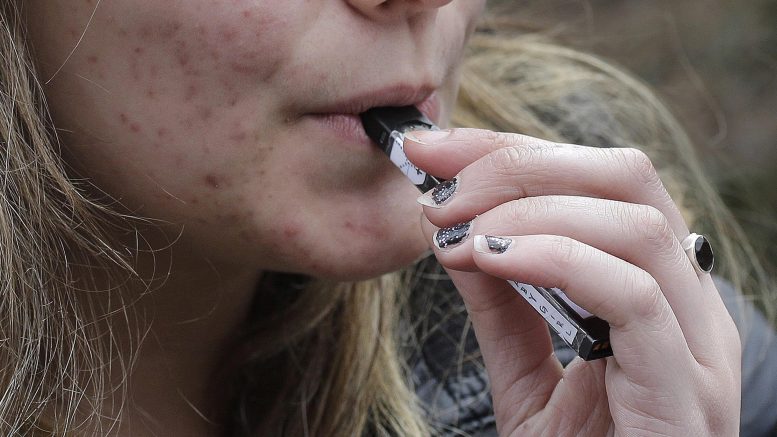A class action lawsuit filed last week claims the country’s largest producers of e-cigarettes concealed health risks and marketed to children.
Lawyers for two Alabama college students filed the suit against Juul Labs Inc., Altria Group and Phillip Morris last week. University of Alabama student Elizabeth Ann Swearingen and Auburn student John Thomas Via Peavy both became addicted to Juul products without knowing they contained nicotine, according to the lawsuit.
The class action seeks to represent adults and minors in Alabama and across the United States who have used a Juul e-cigarette.
“Mimicking on Big Tobacco’s past marketing practices, defendants prey on youth to recruit replacement smokers for financial gain,” attorney Robert G. Methvin Jr. of Birmingham firm Methvin, Terrell, Yancey, Stephens & Miller PC wrote in the complaint.
Nearly identical complaints against Juul Labs Inc., Altria Group and Phillip Morris have been filed across the country. The suits have been filed on behalf of minors and adults in states including Florida, California, New York and Pennsylvania.
Altria is one of the largest producers of tobacco products worldwide. The corporation owns Marlboro producer Phillip Morris and recently acquired a 35 percent stake in Juul, which launched in 2015.
According to the lawsuit, the two college students preferred Juul’s mango flavor, which critics have said is marketed to young users who prefer a fruity taste over traditional tobacco. Swearingen, 19, is a former cross-country athlete, the attorneys said, who now has trouble breathing while performing simple tasks. Peavy, also 19, claims similar problems including severe chest congestion and decreased appetite.
A suit filed in Florida last month says an addicted 15-year-old user now suffers from nicotine-induced seizures. Juul was launched in 2015 and now controls nearly three-quarters of the $3.7 billion retail market for e-cigarettes.
The lawsuit was filed a week after North Carolina’s attorney general sued the company, asking a court to limit which flavors it can sell and ensure underage teenagers can’t buy Juul products. The Massachusetts attorney general announced in 2018 that state officials are investigating the company’s marketing, but the suit filed in traditionally tobacco-friendly North Carolina is the first legal action taken by a state attorney general.
E-cigarettes are electronic devices that heat a liquid containing high levels of nicotine to produce an aerosol, or mix of small particles in the air. Juul devices are shaped like a USB drive and can be charged by a computer.
Attorneys in the Alabama lawsuit claim Juul fraudulently concealed important safety information on how addictive e-cigarettes are, saying the device delivers up to 36 percent more nicotine than a puff from a traditional cigarette. The company copied old tobacco company’s methods of marketing to youth, the lawsuit says, with a heavy social media presence and advertisements depicting “cool,” “carefree,” and “stylish” imagery aimed at non-smoking teenagers.
The lawsuit includes claims of fraud, liability, negligence and violation of the Racketeer Influenced and Corrupt Organizations (RICO) Act. A U.S. District Judge issued an opinion in 2006 holding tobacco companies liable for violating RICO by covering up health risks associated with smoking and marketing to children.
U.S. District Judge Scott Coogler will preside over the case, filed May 22 in the Northern District of Alabama’s western division.
Surgeon General Dr. Jerome Adams issued an advisory on the increasing use of e-cigarettes among young people late last year, calling the trend an epidemic.
Juul responded, posting a message on Twitter saying the company shared the Surgeon General’s goal of preventing youth from using nicotine.
“We cannot fulfill our mission to provide the world’s one billion adult smokers with a true alternative to combustible cigarettes if youth use continues unabated,” the Tweet read.
Juul’s plan for deterring youth use, according to the company website, includes deactivating Facebook and Instagram accounts for marketing, suspending the sale and distribution of nontobacco and nonmenthol JuuL pods to more than 90,000 retail stores and requiring online consumers to be at least 21 to purchase its product.
Experts say that although using e-cigarettes appears less harmful over the long run than smoking regular cigarettes, that doesn’t mean they’re safe — particularly for youth, young adults, pregnant women or adults who do not currently use tobacco products.
Source: www.tuscaloosanews.com





Be the first to comment on "Students in Alabama Join Class Action Lawsuit Against E-Cigarette Makers"